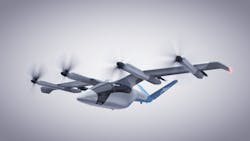Vertical Aerospace secures ATI funding for $2.9 million 'smart charger' development project
BRISTOL, UK - Vertical Aerospace has received investment from the Aerospace Technology Institute (ATI), to fund the development of a smart charger for their electric aircraft. The charger will increase Vertical’s in-flight performance and safety for their recently unveiled passenger model, VA-1X.
This two-year project, expected to be completed by October 2022, starts a new wave of aviation battery development. Most development in battery technology in recent years has come from the automotive sector, however these batteries are not optimized for aviation gravimetric energy or power density requirements. The collaboration between Vertical and Warwick University will take electrochemical concepts and principals from academia and apply them to the production of a charger with an incorporated diagnostic device, effectively a smart charger.
The charger will analyze in-flight and charge event data. This data could then be used to optimize battery lifetime, schedule maintenance and detect anomalies. The charger will be able to determine battery lifetime, state of charge, and will detect any potential failures onboard the vehicle's battery before they happen. This will give Vertical enhanced in-flight performance, safety, and the ability to produce a pre-flight fitness report for the battery.
Vertical will be joined in this project by technical experts from Warwick University. Warwick will be researching the algorithms and models from automotive, ground storage and academia that are suitable for this application. Vertical will then put this into practice, by creating a suitable charger hardware which will then be tested on one or more of Vertical’s aircraft.
The smart charger will be used for Vertical’s recently unveiled passenger model, VA-1X. Capable of carrying a pilot and four passengers for 100 miles at speeds of 150 mph. They are aiming to certify in early 2024 and start initial commercial services shortly after.
